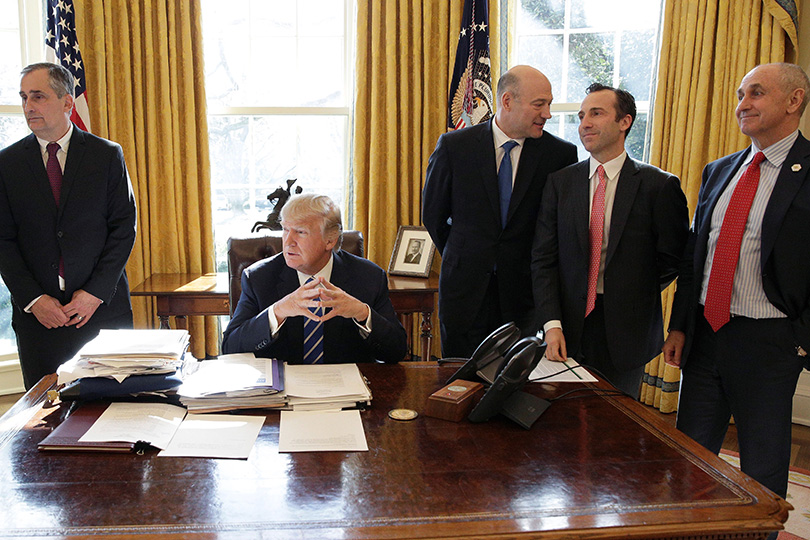MARK S. WEINER
Stephen Bannon may be out, but don’t breathe a sigh of relief. His exit poses a new, more fundamental danger for liberals worldwide. With the departure of the Trump administration’s foremost court intellectual, liberals may be tempted to maintain the strategic tack they took during the presidential campaign, when they criticized Donald Trump mainly for his temperament, not his ideas, and by implication characterized his followers on the same basis.
Such criticism is understandable but ultimately self-defeating, because it subverts the very basis of the liberal, open society famously defined by Karl Popper: critical, scientific engagement at the level of ideas.
What’s more, failing to recognize what Bannon called “the Trump presidency that we fought for and won” as a philosophical movement means missing an opportunity to develop liberalism’s core values in the context of our own time. Forging a path between elite managerialism and authoritarian populism – the daunting task of liberalism for our age – requires knowing precisely where we are starting.
In this light, now is a crucial moment to reflect upon Bannon’s worldview – especially his philosophy of history. Trumpism, as a hostile takeover of the Republican party, was built from the start on an elegiac slogan: “Make America Great Again.” Temporality was at the core of its campaign brand, guided by nostalgia for “the good old days.” Bannon has sought to develop this brand into a robust popular historical consciousness, and his exit from the administration will only liberate him from the constraints of actually existing institutions.
Abundant evidence of Bannon’s views about the nature of historical change are found in his documentary film Generation Zero (2010), which in retrospect looks like a playbook for the 2017 campaign.
The film argues that the 2008 financial crisis was caused by the liberalization of American moral values during the 1960s, when the Baby Boomers’ narcissism led to a culture of political graft and economic greed, underwritten by the marriage of government and business elites. These elites socialized the Baby Boomers’ debts and foisted them onto future generations and the forgotten middle class, leading to economic carnage and lost faith in public institutions. From this nadir, Bannon explains, America will be either destroyed or renewed.
The film’s narrative structure, particularly its driving movement toward cataclysm and rebirth, is provided by William Strauss and Neil Howe’s The Fourth Turning (1997), a best-selling work of sociology. Many commentators have noted with alarm the influence of the book’s apocalyptic tone on Bannon’s worldview. But more troubling is the book’s essentially Jungian argument about the mechanism of historical change.
More precisely, the book superimposes Jungian psychological archetypes onto the view, drawn from historians such as Arnold Toynbee, that history follows predictable, recurring patterns. According to Strauss and Howe, a finite set of mythic archetypes characterizes not only individuals but also the generations to which they belong. Their differing qualities provide the engine for inter-generational conflict and historical change.
Just as there are four stages of an individual human life, so there are four stages within a hundred-year era. A “Hero” generation, like that which fought World War II, is inevitably followed by an “Artist” generation, which necessarily gives rise to a moralistic “Prophet” generation that makes way for a “Nomad” generation – which in turn gives birth to a new generation of Heroes.
The balance and interaction between these generations over time leads a society to undergo a predictable set of “turnings,” from an optimistic “High” to a rebellious “Awakening,” and from there through a corrosive “Unraveling” leading to a fraught “Crisis,” which ends with a new “High.” The Crisis stage always hits American society particularly hard, because the United States has so profoundly embraced a linear understanding of time. Yet come it will, and when it does, America will either collapse or be made great again.
For Strauss and Howe, history is cyclical, its content is mythic, and its study leads to prophesy. This perspective, they argue, offers a number of concrete personal benefits, assuming that readers can unlearn the teachings of linear history (including, bracingly, “obsessive fear of death”). Most important, it offers readers “a more personal connection with the past and future,” and the feeling of being “active participants in a destiny that is both positive and plausible.” It offers readers a sense of control.
Popper had a name for such predictive historical thinking, so contrary to the scientific method. He called it “historicism.” His foundational contribution to modern liberalism, The Open Society and its Enemies (1945), is an analysis of historicism’s roots and implications for liberal democracy. In other words, our use today of the very term “open society” derives from a withering critique of the philosophy of history Bannon embraces.
Popper viewed Hegel as the main source of historicism in the modern era. But he traces the historicist attitude back to Plato, whose anti-democratic ideologies of permanent social hierarchy he interprets as a reaction to the breakdown of Greek tribalism – an effort to recover lost certainties.
Indeed, Popper views all forms of contemporary historicism, even the “remarkable” work of Toynbee himself, as an effort to resuscitate tribalism’s “closed society.” For Popper, prophetic history represents a misguided philosophical reaction against freedom, change, and individualism.
In the midst of World War II and the fight against fascism, Popper offered an alternative to the neo-tribalism of historicism: science and rationalist philosophy, or “the tradition of challenging theories and myths and of critically discussing them.” And he provided a view of historical change that rejects inevitability. Only this humane response to tribalism’s breakdown, he asserted, could set the world free and maintain its liberty.
Popper’s analysis is as important today as it was in his own time. Following Bannon’s departure, the worst thing liberals could do is to ignore Trumpism’s animating principles – for by doing so, they will subvert their own.







Comments